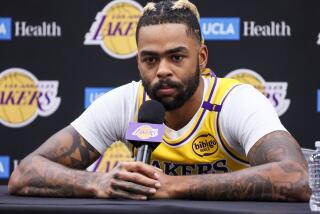DEBATE RAGES : Is Chamberlain’s Dominance Diminished by Limited Number of Rings?
- Share via
Informed that All-Star teams on which both he and fellow center Wilt Chamberlain played had won only three times in six tries, Bill Russell was asked what he thought that meant.
“It tells me,” Russell said, “that Wilt didn’t know how to play forward.”
Chamberlain and Russell. They battled each other on the court. They needled each other off the court. But they will forever be linked as the twin towers who gave credibility to a fledgling NBA and set standards that have been emulated by only Kareem Abdul-Jabbar and perhaps George Mikan among all the big men who have played the game.
Who was the best center of the four, the best to ever play the position? That debate may rage on in sports bars and on talk shows forever.
The common refrain is that Chamberlain set the records, Russell and Mikan won the championships and Abdul-Jabbar did some of both.
The numbers certainly bolster that point of view. Chamberlain averaged 50.4 points one season, scored 100 points in one game and pulled down 55 rebounds in another, all league records. He led the league in rebounding 11 times and in scoring seven times. He is the league’s all-time rebounding leader with 23,924 and is second only to Abdul-Jabbar in points with 31,419. Chamberlain, however, won only two titles, one with the Lakers, the other with the Philadelphia 76ers.
But Bill Sharman, Chamberlain’s coach in the season in which he led the Lakers to their first title, rejects any criticism of Chamberlain.
“He was a winner,” said Sharman, a former Celtic player. “He won two championships. And when you look at championships, you have to look at the whole team. You have to have other great players around you. On some of those Celtic teams, we had seven Hall of Famers.
“I have to say that Chamberlain could do more things any other center. That is what made him unique. He came in as a big scorer, he set the records in scoring and rebounding and he even led the league in assists one year. But the year I took over the Lakers, I met with Wilt before the season and told him that I really wanted him to concentrate on defense, to move out a little farther where he could block shots, or at least scare the shooter. He said to me, ‘I am for anything that will win games.’ I really feel he made more adjustments than any other big man.”
Perhaps the biggest adjustment Chamberlain made that season came before it started.
In previous coaching stints in the American Basketball Assn. and the American Basketball League, Sharman had instituted the practice of having a shootaround the morning of a game to loosen up the players. He wanted to try the same thing in his first season with the Lakers, but he knew the idea would go nowhere without Chamberlain’s approval.
So Sharman invited his center out to lunch to broach the subject. But midway through the meal, Sharman realized that he had forgotten his wallet.
“Great,” Sharman thought. “This will go over real big. I’m about to squander my goodwill and I haven’t even brought up the shootaround yet. If I lose on that, the other players will feel I’ve lost control of Wilt.”
Was a season hanging precariously between Coach Bill and a lunch bill?
Sharman never had to find out. The restaurant owner spotted the famous pair and insisted on whisking the bill away.
Sharman quickly brought up the subject of the shootaround before anything else could go wrong and Chamberlain was open-minded.
“I don’t like the idea of getting up that early [for a 10 a.m. shootaround],” he said. “I usually get up around noon. But I’ll try it if you think it will help the team.”
It certainly didn’t hurt. With Chamberlain missing only two shootarounds all season, and explaining his absence in advance of both of those, the Lakers enjoyed their greatest season. They won 33 in a row, the all-time record for any professional team, en route to a then-record 69-13 mark. The team concluded its dream season by winning the NBA finals in five games over the New York Knicks for the Lakers’ first L.A. title.
Chamberlain was a dominant figure on that team right up to the end.
Guard Gail Goodrich, driving to the Forum for Game 5 of the finals, spotted a sign on an Inglewood High message board announcing that Chamberlain and his volleyball team would be staging an exhibition the following night.
“I knew then that we were going to win it that night,” Goodrich later said. “I knew that Wilt was coming to play because he had scheduled that volleyball match for the next night and he wasn’t planning on missing it.”
He didn’t have to. He had 24 points and 29 rebounds and the Lakers closed out the season with a 114-100 victory.
But there were other seasons that closed far differently. And it was those other endings that gave fuel to the Chamberlain critics.
Like 1969.
The Lakers and Celtics, Russell and Chamberlain, were locked in another NBA finals. In Game 7 at the Forum, the Lakers trailed by seven points with a little more than five minutes to play.
At that point, Chamberlain suffered a knee injury and asked out of the game. When the Lakers pulled to within one near the end, Chamberlain told Coach Bill Van Breda Kolff he wanted back in.
Van Breda Kolff, who was feuding with Chamberlain, told Chamberlain, “We’re doing well enough without you.”
Not quite. The Lakers lost, 108-106.
Van Breda Kolff was fired. And Chamberlain was once again branded a loser.
It was a tag he never quite shed.
(BEGIN TEXT OF INFOBOX / INFOGRAPHIC)
Head to Head
*--*
CHAMBERLAIN RUSSELL 28.7 Points a game 14.5 28.7 Rebounds a game 27.3 60 Team wins 87 2 NBA championships 11
*--*
Note: For the 1964-65 season, Chamberlain signed a contract with the San Francisco Warriors for $100,000. Russell then had his Boston Celtic contract negotiated for $100,001.
More to Read
All things Lakers, all the time.
Get all the Lakers news you need in Dan Woike's weekly newsletter.
You may occasionally receive promotional content from the Los Angeles Times.







